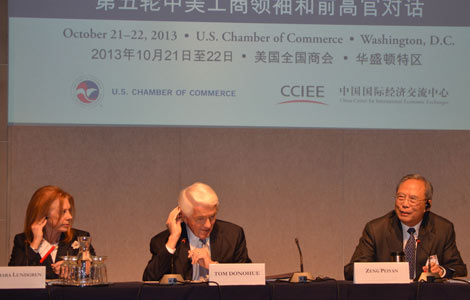Military drills cloud Korean Peninsula
Updated: 2013-10-24 07:12
By Wang Hui (China Daily USA)
|
||||||||
With the crisis in the Middle East showing signs of abating, what has happened this month on the Korean Peninsula has dimmed hopes that a similar easing of tensions or reconciliation would also emerge in the region.
The Syria chemical weapons issue is being resolved in accordance with a UN Security Council resolution. The Geneva II round of peace talks on Syria is scheduled to be held on Nov 23 and 24. Meanwhile, global powers just concluded a new round of negotiations with Iran last week in Geneva and issued, for the first time, a joint statement which may herald greater opportunities for a political resolution to the decades-old Iranian nuclear standoff.
But on the Korean Peninsula, the atmosphere is totally different. We have seen evidence this month that the US and its allies in the region are mounting military pressure on Pyongyang, which runs the risk of reversing the recent easing of tensions on the peninsula.
Since the beginning of October, the US has staged joint military exercises with the Republic of Korea and a separate joint maritime drill with the ROK and Japan. This involved a US aircraft carrier in waters off the peninsula. In response to the war games on its doorstep, Pyongyang announced that it placed all military forces on full alert.
On Oct 2, defense chiefs in Washington and Seoul signed the so-called Tailored Deterrence Strategy that will allow the allies to launch preemptive strikes against Pyongyang's nuclear capabilities.
This new pressure on Pyongyang by the US and its allies may ignite a vicious circle of retaliation. Under such circumstances, it is significant that Chinese experts attending a forum held last week in Dalian, Liaoning province, tried to drive home the message that cooperation and negotiations are the only way to building peace and stability on the peninsula.
It is beyond doubt that China has a stake in a stable peninsula. Pyongyang's pursuit of a nuclear power status threatens the interests of countries in the region, including those of China. The crux of the matter now lies in how to persuade Pyongyang into giving up its dangerous ambition.
Experience tells us military pressure and confrontation would be to little avail but only push Pyongyang to take an even harder line. That may well explain that experts attending the Dalian Forum, sponsored by Dalian University of Technology, support dialogue and negotiations within the framework of the Six-Party Talks, which group China, the Democratic People's Republic of Korea, the US, the ROK, Russia and Japan.
As Beijing has been widely perceived as holding some sway over Pyongyang, there is a good prospect for it to step up cooperation with Washington and Seoul over the peninsula issue, the experts agreed.
In fact, China's participation in resolving the DPRK nuclear issue has helped propel China's image as a responsible power committed to regional stability, and thus reshaped some US assumptions on China, said Wang Fan, an international affairs professor at China Foreign Affairs University.
Either sanctioning Pyongyang or engaging with it, Washington would need China's cooperation, and the mutual need for enhancing cooperation has certainly become stronger after Pyongyang conducted its third nuclear test on Feb 12, said Wang.
In the same vein, Cui Ge, an associate professor of international politics at Dalian University of Technology suggested that Beijing should strengthen cooperation with Seoul over the peninsula issue too. There is a good opportunity for the two neighbors to build on their fruitful results from bilateral cooperation in trade and deepen collaboration on security issues, especially the peninsula issue, said Cui.
The two have announced the setting up of a hotline between their leaders earlier this year. Both close neighbors to the DPRK, Beijing and Seoul have a practical need to deepen strategic mutual trust, avoid strategic misjudgment and heed each other's mutual concerns, Cui said.
Considering that Beijing has called for the resumption of the Six-Party Talks several times this year, intensifying cooperation with Washington and Seoul would help bridge the gaps between the two camps and create the conditions for bringing concerned parties back to the negotiating table.
The author is a senior writer with China Daily. wanghui@chinadaily.com.cn
(China Daily USA10/24/2013 page12)

 Mass. teacher slain; 14-year-old student charged
Mass. teacher slain; 14-year-old student charged
 Latin American clown convention
Latin American clown convention
 Driven by smiles
Driven by smiles
 Camp gives sporting chance for students headed overseas
Camp gives sporting chance for students headed overseas
 Chinese protest UK 'fishing' raids
Chinese protest UK 'fishing' raids
 Caretakers in need of counseling
Caretakers in need of counseling Pumpkin fun ahead of Halloween
Pumpkin fun ahead of Halloween
 Weakening Raymond soaks Mexico, no serious damage
Weakening Raymond soaks Mexico, no serious damage
Most Viewed
Editor's Picks

|

|

|

|

|

|
Today's Top News
China's GDP growth to 7.6%: Standard Chartered
Scholar looks at the kung fu-hip hop connection
Mobile giants talk future in Frisco
Starbucks' pricing furor: tempest in a coffee pot
100,000 Strong student exchange picks first partners
Report: China could profit rebuilding US
US-China trade talks a 'turning point'
Steady growth the goal for GDP
US Weekly

|

|







